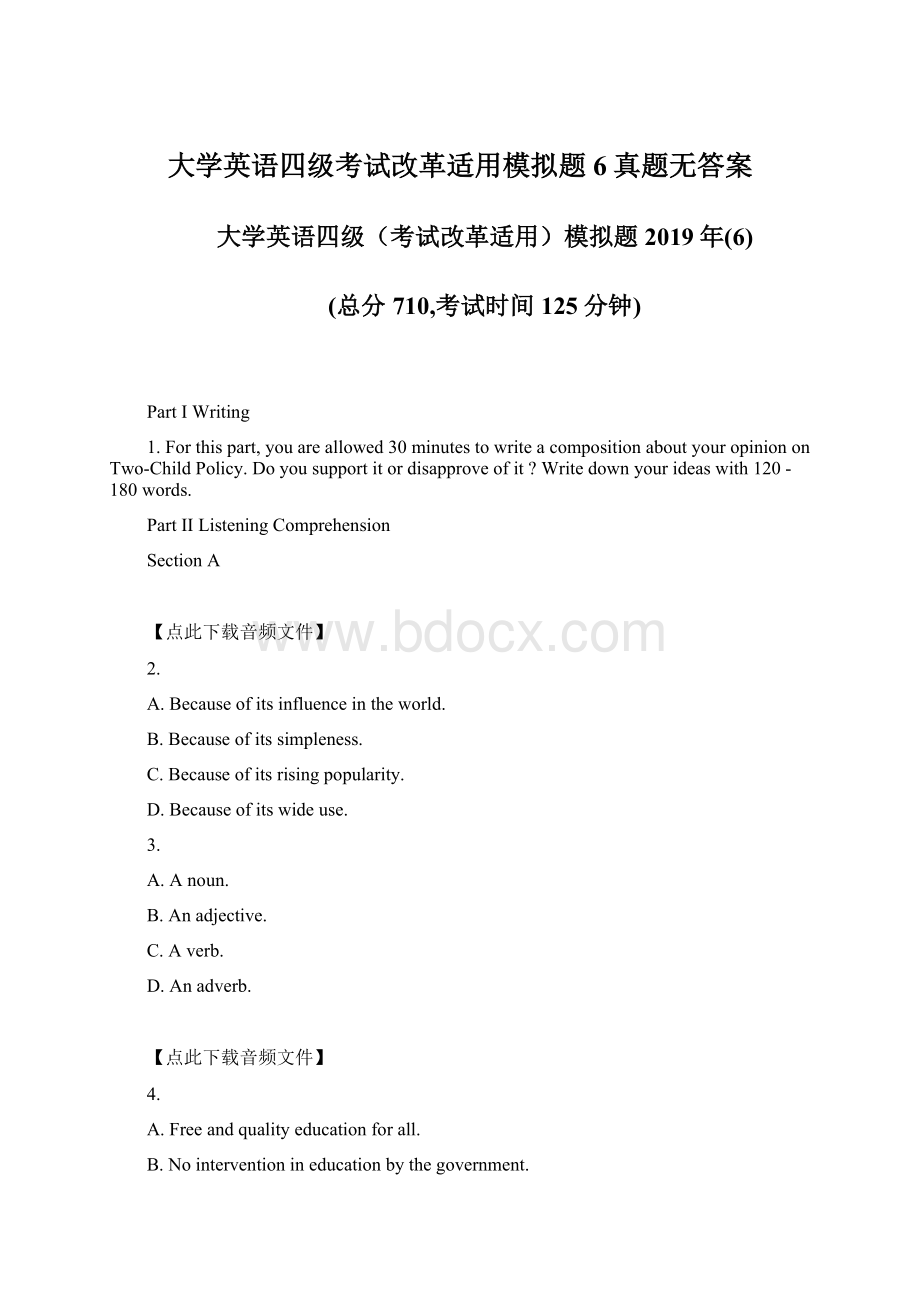大学英语四级考试改革适用模拟题6真题无答案.docx
《大学英语四级考试改革适用模拟题6真题无答案.docx》由会员分享,可在线阅读,更多相关《大学英语四级考试改革适用模拟题6真题无答案.docx(12页珍藏版)》请在冰豆网上搜索。

大学英语四级考试改革适用模拟题6真题无答案
大学英语四级(考试改革适用)模拟题2019年(6)
(总分710,考试时间125分钟)
PartIWriting
1.Forthispart,youareallowed30minutestowriteacompositionaboutyouropiniononTwo-ChildPolicy.Doyousupportitordisapproveofit?
Writedownyourideaswith120-180words.
PartIIListeningComprehension
SectionA
【点此下载音频文件】
2.
A.Becauseofitsinfluenceintheworld.
B.Becauseofitssimpleness.
C.Becauseofitsrisingpopularity.
D.Becauseofitswideuse.
3.
A.Anoun.
B.Anadjective.
C.Averb.
D.Anadverb.
【点此下载音频文件】
4.
A.Freeandqualityeducationforall.
B.Nointerventionineducationbythegovernment.
C.Morefreedomofeducationforchildren.
D.NointerventionineducationbyEuropeancountries.
5.
A.Europeancountriesinterveneditsdecision-makingineducation.
B.Thegovernmentmadestrictpoliciesabouteducation.
C.Thegovernmentdidn'tprovideenoughmoneytouniversities.
D.Thegovernmentannouncedthatuniversitiesmayraisefeesbyasmuchas8percent.
【点此下载音频文件】
6.
A.Becauseitislocatedinaspecialplace.
B.Becauseithasbeenseriouslypolluted.
C.Becauseit'ssohighinsaltandmineralsthatplantsandfishcan'tsurviveinit.
D.Becauseallcreaturesinithavebeenkilled.
7.
A.900milliondollars.
B.9billiondollars.
C.90milliondollars.
D.9milliondollars.
8.
A.Becauseofclimatechange.
B.Becauseofthebuildingsaroundit.
C.Becauseofhumanactivities.
D.Becauseofanactofnature.
SectionB
【点此下载音频文件】
9.
A.BecauseJapanesegovernmentencouragespeopletowork.
B.BecauseJapaneselikeworking.
C.BecauseJapanesehaveareputationforworkinghard.
D.BecauseJapanesehavemoreworkethic.
10.
A.70.B.55.
C.65.D.60
11.
A.Shewantstogetjobsatisfaction.
B.Shehastosupportherfamily.
C.Shewantstorealizeherownvalue.
D.Shewantsmoreworkingexperience.
12.
A.60yearsold.
B.70yearsold.
C.65yearsold.
D.75yearsold.
【点此下载音频文件】
13.
A.Drivingquickly.
B.Drinkingalot.
C.Fidgeting.
D.Beinglazy.
14.
A.Theyfeelacceptable.
B.Theydon'tcareabouthishabit.
C.Theystronglyopposehishabit.
D.Theyfeelalittlebituncomfortable.
15.
A.Hiscareless.
B.Hisimpatience.
C.Hisaspirationforexcitement.
D.Hisbraveness.
16.
A.Heislikelytobetroubledincaraccident.
B.Heprobablylosthislicence.
C.Heprobablylosthistemper.
D.Hewouldprobablybefined.
SectionC
【点此下载音频文件】
17.
A.Tointroducemoreinvestment.
B.Toenhancetherelationshipbetweentwocities.
C.Toencouragetwocitiestoexchangeexperienceofrunninganinternationalfinancialcenter.
D.Topromotemoreexchangesinculture.
18.
A.Britain.
B.German.
C.France.
D.Norway.
19.
A.Nomorethan16billiondollars.
B.Nomorethan1.7billiondollars.
C.Nolessthan16billiondollars.
D.Nolessthan1.7billiondollars.
【点此下载音频文件】
20.
A.Inthe1940s.
B.Inthemid-1990s.
C.Inthe1970s.
D.Inthe1990s.
21.
A.Becausetheyweredevelopedverywell.
B.Becausetheywereportableforeveryconsumers.
C.Becausetheysoldverywellintheworld.
D.Becausetheywereaffordabletoindividualconsumers.
22.
A.Theimprovementofcomputers'performance.
B.Theformationofanetwork.
C.Theexpansionofmarketingchannels.
D.Theimprovementofitsafter-salesservice.
【点此下载音频文件】
23.
A.64B.C.
B.604A.D.
C.64A.D.
D.604B.C.
24.
A.SantiagoCalatrava.
B.AntonioGaudi.
C.SirChristopherWren.
D.LeCorbusier.
25.
A.Itsprosperityanddevelopment.
B.Itssophisticatedartistictechnique.
C.ThehegemonyofBritainEmpire.
D.Thedeterminationofthefivemonarehs.
26.
A.ThethanksgivingservicesforboththeGoldenJubileeand80thBirthdayofHerMajestytheQueen.
B.ThefuneralsofLordNelson.
C.ThelaunchoftheFestivalofBritain.
D.JubileecelebrationsforQueenVictoria.
PartIIIReadingComprehension
SectionA
Thetypicalpre-industrialfamilynotonlyhadagoodmanychildren,butnumerousother【C1】______aswell—grandparents,uncles,auntsandcousins.Such"extended"familieswere【C2】______forsurvivalinslowpacedagriculturalsocieties.Butsuchfamiliesarehardtotransplant.Theyare【C3】______.Industrialismdemandedmassesofworkersreadyandabletomoveoffthelandin【C4】______ofjobs,andtomoveagainwhenevernecessary.Thustheextendedfamily【C5】______sheditsexcessweightandtheso-called"nuclear"familyemerged—astripped-down,portablefamilyunitconsistingonlyofparentsandasmallsetofchildren.Thisnewstylefamily,farmore【C6】______thanthetraditionalextendedfamily,becamethestandardmodelinalltheindustrialcountries.Super-industrialism,however,thenextstageofeco-technologicaldevelopment,【C7】______evenhighermobility.Thuswemayexpectmanyamongthepeopleofthefuturetocarrythestreamliningprocess,astepfurtherbyremainingchildren,【C8】______thefamilydowntoitsmore**ponents,amanandawoman.Twopeople,perhapswithmatchedcareers,willprovemoreefficientat【C9】______througheducationandsocialstatus,throughjobchangesandgeographicrelocations,thantheordinarilychild-clutteredfamily.Acompromisemaybethepostponementofchildren,ratherthanchildlessness.Menandwomentodayareoftentornin【C10】______betweenacommitmenttocareerandacommitmenttochildren.Inthefuture,manycoupleswillsidestepthisproblembydeferringtheentiretaskofraisingchildrenuntilafterretirement.
A)needI)suited
B)dependentsJ)requests
C)graduallyK)navigating
D)consistingL)immobile
E)harmonyM)requires
F)conflictN)pursuit
G)continuallyO)cutting
H)mobile
27.【C1】
28.【C2】
29.【C3】
30.【C4】
31.【C5】
32.【C6】
33.【C7】
34.【C8】
35.【C9】
36.【C10】
SectionB
TVLinkedtoLowerMarks
[A]Theeffectoftelevisiononchildrenhasbeendebatedeversincethefirstsetswereturnedon.Nowthreenewstudiesfindthattoomuchtubetimecanlowertestscores,retardlearningandevenpredictcollegeperformance.ThereportsappearintheJulyissueoftheArchivesofPediatrics&AdolescentMedicine.
[B]Inthefirstreport,researchersstudiedtheeffectthathavingaTVinachild'sbedroomcanhaveonthirdgraders."Welookedatthehouseholdmediaenvironmentinrelationtoacademicachievementonmathematics,readingandlanguageartstests,"saidstudyauthorDinaL.G.Borzekowski,anassistantprofessoratJohnsHopkinsBloombergSchoolofPublicHealth.
[C]Borzekowskiandhercolleague,Dr.ThomasRobinsonofStanfordUniversity,collecteddataon386thirdgradersandtheirparentsabouthowmuchTVthechildrenwatched,thenumberofTVsets,computersandvideogameconsolesinthehouseholdandwheretheywere.Theyalsocollecteddataonhowmuchtimethechildrenspentusingthedifferentmedia,aswellasthetimespentdoinghomeworkandreading.Theresearchersfoundthatthemediainthehousehold,whereitisandhowitisusedcanhaveaprofoundeffectonlearning."Wefoundthatthehouseholdmediaenvironmenthasaverycloseassociationwithperformanceonthedifferenttestscores,"Borzekowskisaid.
[D]"AchildwhohasaTVinhisorherbedroomislikelytohaveascorethatiseightpointsloweronamathematics**paredtoachildwhodoesn'thaveaTVinthebedroom,"shenoted.Thesechildrenalsoscoredloweronthereadingandlanguageartstests.However,childrenwhohaveaccesstoa**puterarelikelytohavehigherscoresoneachofthe**paredwithchildrenwhodon'thaveaccesstoa**puter,Borzekowskinoted.
[E]ThereasonswhyTVhasthisnegativeeffectarenotclear,Borzekowskisaid."Whenthere'sTVinthebedroom,parentsarelesslikelytohavecontroloverthecontentandtheamountwatched,"Borzekowskisaid."Theyarealsounabletoknowhowearlyorhowlatethesetison.Thisseemstobeassociatedwithkids'performanceonacademictests."BorzekowskibelievesthatcontentandthetimetheTVisonmaybetheprimaryreasonsforitsnegativeeffect."IftheTVisinthefamilyroom,thenparentscanseethecontentofwhatchildrenarewatching,"shesaid."Parentscanchoosetositalongsideandwatch,orturnthesetoff.Asimpleandstraightforward,positiveparentingstrategyistokeeptheTVoutofthechild'sbedroom,orremoveitifit'salreadythere."
[F]Inthesecondreport,Dr.RobertJ.HancoxfromtheUniversityofOtagoinDunedin,NewZealand,andhiscolleaguesfound,regardlessofyourintelligenceorsocialbackground,ifyouwatchalotofTVduringchildhood,youarealotlesslikelytohaveacollegedegreebyyourmid-20s.Intheirstudy,theresearchersfollowed1,037peoplebornin1972and1973.Everytwoyears,betweentheagesof5and15,theywereaskedhowmuchtelevisiontheywatched.Theresearchersfoundthatthosewhowatchedthemosttelevisionduringtheseyearshadearnedfewerdegreesbythetimetheywere26."Wefoundthatthemoretelevisionthechildhadwatched,themorelikelytheyweretoleaveschoolwithoutanyqualifications,"Hancoxsaidinapreparedstatement."Thosewhowatchedlittletelevisionhadthebestchanceofgoingontouniversityandearningadegree."
[G]Hancox'steamfoundthatwatchingTVatanearlyagehadthemosteffectongraduatingfromcollege."Aninterestingfindingwasthatalthoughteenageviewingwasstronglylinkedtoleavingschoolwithoutanyqualifications,itwasearlierchildhoodviewingthathadthegreatestimpactongettingadegree,"hesaid."Thissuggeststhatexcessivetelevisioninyoungerchildrenhasalong-lastingadverseeffectoneducationalperformance.
[H]Inthethirdpaper,FrederickJ.ZimmermanandDr.DimitriA.ChristakisfromtheUniversityofWashingt